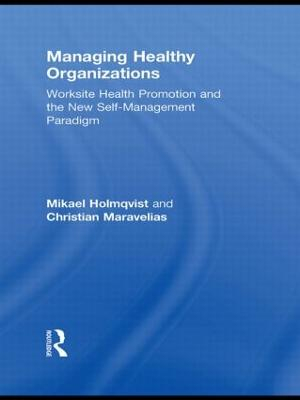

Managing Healthy Organizations
- Utgiven: 2010
- ISBN: 9780415873895
- Sidor: 182 st
- Förlag: Routledge
- Format: Inbunden
- Språk: Engelska
Om boken
Work-site health promotion is generally thought to be a good thing. During the past two decades, corporate management has come to take an active role in health promotion programming for employees, offering health education, screenings, therapy, and even leisure initiatives. By 2001 almost 9 out of 10 large employers in Europe and in the U.S. offered some form of work site health promotion program to its employees. As a result, work site health promotion programs are becoming primary sources of information and knowledge about healthy forms of work and life. However, little attention has been given to how contemporary worksite health programs in fact blur the traditional distinction between work and private life. Furthermore, the studies of work and health to date have tended to take for granted that health programs are primarily aligned with employees' interests and that they are instigated by various reform movements and workers' struggles to expose and reduce hazards related to their work. This has resulted in that little research on the other side of the work-health nexus: how employers factor health considerations into workforce management and productivity control.With the advancement of 'work-site health promotion' in contemporary organizations, Holmqvist and Maravelias argue that this narrow focus, and the typical uncritical standpoint towards initiatives which are taken in the name of employees' health, is inadequate. Typical elements of work-site health promotion programs such as life-style examination and coaching, accident prevention, risk behavior assessment, and help to self-help indicate that initiatives which are taken for employees' health are becoming parts of a new, more encompassing form of managerial consideration of employees. At a more fundamental level, the advancement of work-site health promotion may be a sign of a new or altered corporate health ethic: in contrast to the old corporate health ethic that was narrow and specific to the workplace, the new corporate health ethic appears to judge the 'whole employee' and especially what the whole employee may become; the risks one faces and the abilities one has to shoulder the responsibility for developing into a real corporate value.
Åtkomstkoder och digitalt tilläggsmaterial garanteras inte med begagnade böcker
Mer om Managing Healthy Organizations (2010)
I augusti 2010 släpptes boken Managing Healthy Organizations skriven av Mikael Holmqvist, Christian Maravelias. Den är skriven på engelska och består av 182 sidor. Förlaget bakom boken är Routledge.
Köp boken Managing Healthy Organizations på Studentapan och spara uppåt 33% jämfört med lägsta nypris hos bokhandeln.
Referera till Managing Healthy Organizations
Harvard
Holmqvist, M. & Maravelias, C. (2010). Managing Healthy Organizations. Routledge.
Oxford
Holmqvist, Mikael & Maravelias, Christian, Managing Healthy Organizations (Routledge, 2010).
APA
Holmqvist, M., & Maravelias, C. (2010). Managing Healthy Organizations. Routledge.
Vancouver
Holmqvist M, Maravelias C. Managing Healthy Organizations. Routledge; 2010.



















